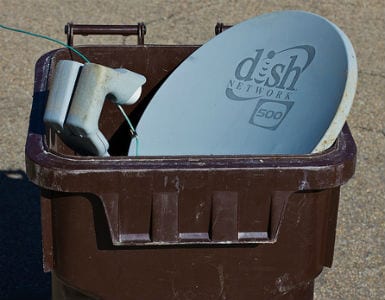 We’ve all seen those houses with 15 different satellite dishes sticking out from every angle. While neighborhood associations and citizen groups have long complained about the eyesore that the clunky dishes present, little has been done in the way of cleaning up building facades that are teeming with the devices.
We’ve all seen those houses with 15 different satellite dishes sticking out from every angle. While neighborhood associations and citizen groups have long complained about the eyesore that the clunky dishes present, little has been done in the way of cleaning up building facades that are teeming with the devices.
Until now, that is. The city of Boston recently joined Philadelphia and Chicago in pushing for a municipal ordinance defining exactly how and where TV satellites can be mounted — setting up a strange, tangled-up web of responsibility that may force homeowners, cities, satellite providers, and perhaps even the FCC to take sides.
And, politicking aside, should any dish restrictions come to pass, they would certainly have a big impact on the work that tens of thousands of service techs at Dish Network, DirecTV and other dish providers perform.
The legislation being bandied about in Boston right now would require satellite dishes to be installed either on people’s roofs or in their backyards — but not on a building facade. Further, should a satellite customer move or cancel their service, it would require that the dish providers come back out and take the unused dish away with them.
“Restrictions on the placement of satellite antennas will increase our service costs,” a spokesperson for Dish Network told the SmartVan. “For instance, the cost per installation could rise because technicians would have to spend more time at each home accommodating burdensome regulations.”
As it stands now, customers typically own the actual satellite dish, meaning providers are under no obligation to remove unwanted hardware. People are “free to move the dish with them or recycle it as they see fit,” says the Satellite Broadcasting & Communications Association (SBCA), an industry trade group. A leftover dish “becomes an issue between them and their landlord or new owner.”
The SBCA is also invoking FCC regulations, called the OTARD rules (Over-the-Air-Reception-Device) that prohibit cities from restricting dish placement, and has since filed legal action against some cities.
Dish Network has nearly 14 million subscribers (industry leader DirecTV has almost 20 million), though not all of them live in cities that are proposing dish regulations. But new regulations could mean dish providers may have to remount and/or remove a lot of equipment. Dish Network also pointed to higher service costs for customers as a result of city dish ordinances.
“They also encourage price increases in video services — both because they make dish installation more expensive and because they encourage subscribers to stay with their incumbent cable operator,” the Dish spokesperson said.
We’re sure to see this legal battle play out for a while, but it certainly seems like something worth keeping an eye on.

Share this: